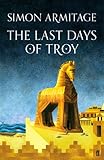 Reviewed by P.P.O. Kane
Reviewed by P.P.O. Kane
The Last Days of Troy
By Simon Armitage
Faber, 2014
ISBN: 9780571315093
You know the story. The abduction of Helen. The wooden horse. The fall of Troy.Simon Armitage’s new play is a vivid re-engineering of Homer and Virgil, a meditation on ‘own’ and ‘other’, an unblinkered look at the costs and sorrows of war. In truth, a play about war (rather than a lion hunt, say, another ancient theme) will always be of the moment: Achilles mutilating Hector’s corpse; a British soldier giving a thumbs-up over the body of a dead insurgent.
It is Andromache’s words after watching Achilles’ act of desecration (they close Act 2, Scene 5) that show Armitage at his best. Not even the creator of Lady Macduff, I’d suggest, could have written a speech as delicately paced, a lament as imbued with loss. Even on the page it moves one to tears.
But there is humour too, even (dare one say it) a Blackadderish flavour to the squabbling of the Immortals and the bickering between Hector and Paris. It is a welcome respite. One line did give me pause, mind, it’s when someone says of Achilles’ diet: ‘He’ll eat anything – he’s from the North.’ Now this reads well on the page, granted, but inwardly I groaned. For I know that when spoken in the Royal Exchange it will be followed by sustained ostensible guffaws. People will be sure to signal they’re amused.
There is, incidentally, an alternate version of the story, one that Armitage doesn’t allude to in his introduction. On this telling, Helen never actually made it to Troy, she was in hiding in Egypt all along. Perhaps a phantom, an eidolon, was ensconced at Troy in her place. The war was all for nothing. Euripides’ Helen (little performed) makes use of this narrative, which can be found in Herodotus too, and it would be interesting to see these two anti-war plays (Euripides’ and Armitage’s) alongside each other.
About the reviewer: P.P.O. Kane lives and works in Manchester, England. He welcomes responses to his reviews and you can reach him at ludic@europe.com